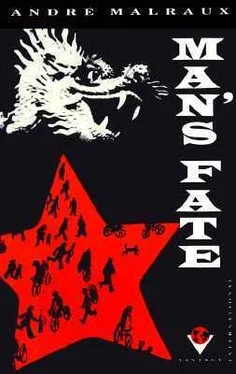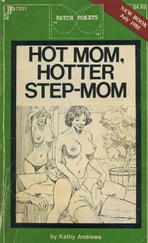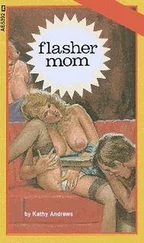“You belong to the crew?”
And, without waiting for an answer:
“Do you like the life on board ship?”
“Say, my dear fellow, you have no idea! A Frenchman likes to travel, that’s a fact: not a word. The officers are sons of bitches but no worse than the owners, and you don’t sleep very well (I don’t like hammocks-a matter of taste) but you eat weU. And you see things. When I was in South America, the missionaries had made the savages learn 1-little Latin canticles by heart-taught them day and night. The bishop arrives, the missionary beats the time: silence-the savages are struck dumb with respect. But not a word! the canticle comes all by itself: the parrots of the forest, my g-good man, who have never heard anything else, sing it with reverence. And just imagine, in the Sea of Celebes, ten years ago, I came across some Arabian caravels, adrift, sculptured like cocoanuts and full of corpses-victims of the plague — with their arms hanging like this over the bulwarks, under a whirling cloud of seagulls. Absolutely. ” “You’re lucky. I’ve been traveling for seven years, and I’ve never seen anything like that.”
“You must introduce the means of art into life, my g-good man, not in order to make art-God, no! — but to make more life. Not a word!”
He tapped him on the belly, and turned away prudently: a car which he recognized was stopping at the end of the gangplank-Ferral was returning to France.
A cabin-boy was beginning to pace the first-class deck, ringing the bell of departure. Each stroke resounded in Clappique’s chest.
“Europe,” he thought; “the feast is over. Now, Europe.” It seemed to be coming towards him with the bell that was approaching, no longer as one of liberation, but as of a prison. But for the menace of death he would have gone back on land.
“Is the third-class bar open?” he asked the Russian. “Been open for an hour. Anyone can go there till we are at sea.”
Clappique took him by the arm:
“Let’s go and get drunk. ”
Six o’clock in the evening
In the large hall-formerly a school-yard-two hundred wounded Communists were waiting to be taken out and shot. Katov, among the last ones brought in, was propped up on one elbow, looking. All were stretched out on the ground. Many were moaning, in an extraordinarily regular way; some were smoking, as had done those of the Post, and the wreaths of smoke vanished upward to the ceiling, already dark in spite of the large European windows, darkened by the evening and the fog. It seemed very high, above all those prostrate men. Although daylight had not yet disappeared, the atmosphere was one of night. “Is it because of the wounds,” Katov wondered, “or because we are all lying down, as in a station? It is a station. We shall leave it for nowhere, and that’s all. ”
Four Chinese sentries were pacing back and forth among the wounded, with fixed bayonets, and their bayonets reflected the weak light strangely, sharp and straight above all those formless bodies. Outside, deep in the fog, yellowish lights-street-lamps no doubt-also seemed to be watching them. As if it had come from them (because it also came from out there in the fog) a whistle rose and submerged the murmurs and groans: that of a locomotive; they were near the Chapei station. In that vast hall there was something atrociously tense, which was not the expectation of death. Katov was enlightened by his own throat: it was thirst-and hunger. With his back against the wall, he was looking from left to right: many faces that he knew, for a great number of the wounded were fighters of the ch'ons. Along one of the narrower walls, a free space, three meters wide, was reserved. “Why are the wounded lying on top of each other,” he asked aloud, “instead of going over there?” He was among the last brought in. Leaning against the wall, he began to raise himself up; although he suffered from his wounds, it seemed to him that he would be able to hold himself upright; but he stopped, still bent over: although not a single word had been said, he sensed around him such a startling terror that it made him motionless. In the looks? He could scarcely make them out. In the attitudes? They were, above all, the attitudes of wounded men, absorbed in their own suffering. Yet, however it was transmitted, the dread was there — not fear, but terror, that of beasts, of men who are alone before the inhuman. Katov, without ceasing to lean against the wall, straddled the body of his neighbor.
“Are you crazy?” asked a voice from the level of the floor.
“Why?”
It was both a question and a command. But no one answered. And one of the guards, five meters away, instead of knocking him down, looked at him with stupefaction.
“Why?” he asked again, more fiercely.
“He doesn’t know,” said another voice, also from the ground, and at the same time, another, still lower: “He’ll find out. ”
He had uttered the second question very loudly. The hesitancy of the crowd was terrifying-both in itself and because almost all these men knew him: the menace hanging over that wall weighed upon them all, but particularly upon him.
“Lie down again,” said one of the wounded.
Why did no one call him by his name? And why did the sentry not interfere? He had seen him, awhile ago, knock down one of the wounded with the butt of his gun, when he had tried to change places. He approached the last one who had spoken and lay down alongside of him.
“That’s where they put those who are to be tortured,” said the man in a low voice.
Katov understood. They all knew, but they had not dared to say it, either because they were afraid to speak of it, or because no one dared to speak to him about it. A voice had said: “He’ll find out. ”
The door opened. Soldiers entered with lanterns, surrounding stretcher-bearers who deposited several wounded, like packages, close to Katov. Night was corning on, it rose from the ground where the groans seemed to run into one another like rats, mingled with a frightful stench: most of the men could not move. The door shut.
Time passed. Nothing but the pacing of the sentries and the last gleam of the bayonets above the thousand sounds of suffering. Suddenly, as if the darkness had made the fog more dense, the locomotive whistle sounded, more muffled, as if from a great distance. One of the new arrivals, lying on his belly, tightened his hands over his ears, and screamed. The others did not cry out, but terror was there again, close to the ground.
The man raised his head, lifted himself up on his elbows.
“Scoundrels,” he screamed, “murderers!”
One of the sentries stepped forward, and with a kick in the ribs turned him over. He became silent. The sentry walked away. The wounded man began to mumble. It was too dark now for Katov to make out his features, but he heard his voice, he felt that he was becoming coherent. Yes-“. don’t shoot, they throw them alive into the boiler of the locomotive,” he was saying. “And now, they’re whistling. ” The sentry was approaching again. Silence, except for the pain.
The door opened again. More bayonets, now lighted up from below by a lantern, but no wounded. A Kuo- rnintang officer entered alone. Although he could no longer see anything but the bulk of the bodies, Katov could feel each man stiffening. The officer, over there, incorporeal, a shadow between the flickering light of the lantern and the twilight behind him, was giving orders to a sentry. The latter approached, sought Katov, found him. Without touching him, without saying a word, with respect, he simply made Katov a sign to get up. He got to his feet with difculty, faced the door, over there, where the officer continued to give orders. The soldier, with a gun on one arm, the lantern on the other, came and stood on his left. To his right, there was only the free space and the blank wall. The soldier pointed to the space with his gun. Katov smiled bitterly, with a despairing pride. But no one saw his face, and all those of the wounded who were not in the throes of death, followed him with their eyes. His shadow grew upon the waU of those who were to be tortured.
Читать дальше











